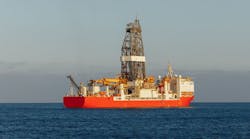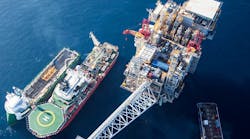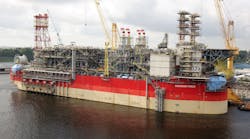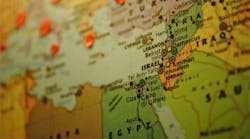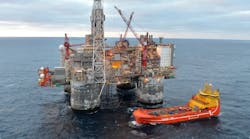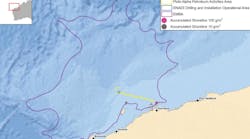Editor's note: This article first appeared in the March-April issue of Offshore magazine. Click here to view the full issue.
By Naama Myers-Altman, US Embassy Israel
Israel’s growing offshore energy and port infrastructure market is an attractive market for American suppliers and businesses with expertise in infrastructure development. With a strong and stable economy led by a high-tech sector and a spirit of innovation, many US companies are considering Israel for opportunities for investment, acquisition and partnerships.
The goal here is to provide an overview of Israel’s offshore oil and gas market and the US presence in the market; European efforts to diversify its gas supply; Israeli offshore clean energy and port development trends; and joint US-Israeli research opportunities. At the same time, the hope here is to provide a spotlight on Israel’s business climate and how the US Commercial Service’s export resources can help American businesses find success in the Israeli market.
Israeli energy trends
Since the first commercial discovery of natural gas in Israel in 2000, the country has been continuously developing its offshore gas resources. Over the past 20 years, the country has transformed from a net importer of fossil fuels, to being self-sufficient and a regional exporter of natural gas, although it still imports crude oil and coal. The country’s coal-generated power is gradually diminishing and accounted for only 26% of Israel’s power in 2020, whereas in 2015 it accounted for 60%. The Israeli Ministry of Energy’s 2030 goal for electricity generation is to replace coal primarily with natural gas, reaching an energy mix comprised of 70% natural gas and 30% renewables, while phasing out coal plants over time. Domestic consumption of natural gas is steadily growing and has reached 12.3 billion cubic meters (bcm) in 2021, a 4.5% increase from 2020. The growth in natural gas consumption was led by the electricity sector, accounting for 79% of generation sources.
Opportunities for participation
In 2021, natural gas production from Leviathan surpassed Tamar and provided more than 50% of Israel’s natural gas. Other international oil companies operating in Israel include Greece’s Energean and its partners, developing the Karish and Tanin fields, as well as block D, which was awarded in 2019. In addition, British companies Cairn and Pharos and their Israeli partners were awarded blocks A and C in 2019.
Even with the increases in domestic natural gas demand, the export market for natural gas produced in Israel is growing significantly. Total exports of natural gas between 2020 and 2021 increased by 68%, of which exports to Egypt grew by 96%, and exports to Jordan grew by 46%.
European gas demand
Europe is looking to diversify its gas supply in the wake of Russia’s war in Ukraine and the global energy crisis. In this context, Israel, Egypt and the EU signed a memorandum of understanding last June, capturing the parties’ interest in increased collaboration on trade, transportation and the export of natural gas to EU countries.
In addition to the existing infrastructure already supporting exports to Egypt and to Jordan, the government of Israel is evaluating a few other pipeline projects that will allow increased exports to these two markets and to new markets. One of the options is a subsea pipeline to Egypt where the gas will be liquified and shipped to Europe. Another option is the ambitious “East-Med” subsea pipeline, currently pending final investment decision, intended to convey gas from Israel’s and Cyprus’ offshore gas fields to Europe.
There are no commercial oil wells in the country and Israel is still relying on imports for oil. Crude oil is transported to one of Israel’s two refineries: the Bazan refinery in the north, and the Paz refinery in the south. Both refineries are privately owned.
“Clean Tech” and port projects
Despite ample solar power potential, Israel continues to fall short of meeting previously stated renewable energy goals, producing only 8% of its electricity from renewable sources in 2021. The vast majority of this renewable energy is solar, but it also includes some wind, biomass and other non-fossil sources. Lack of land resources, bureaucratic bottlenecks, and recent discoveries of offshore gas that can produce electricity at a lower cost than solar are often cited as factors explaining the lower-than-expected use of renewable energy. In 2021, in line with its commitments to the Paris Agreement, the Israeli government updated its greenhouse gas (GHG) emission reduction goal to a 27% decrease in GHG emissions by 2030, with the goal of reaching net-zero targets by 2050 (2015 was used as the base year). An earlier government decision set a target of 30% of electricity to be generated from renewable sources by 2030. To reach these goals, Israel will need to significantly increase its overall installed capacity from renewable energy and energy storage.
Due to the lack of land mass for certain energy projects, the Israeli Ministry of Energy announced in August 2022 its intention to embark on a strategic environmental assessment to examine renewable energy generation and the use of other sustainable technologies offshore. Some of the technologies that will be assessed include wind turbines, solar photovoltaics, energy storage, wave energy, biomass energy (e.g., from seaweed), and generation and transmission of hydrogen. American companies that possess relevant experience are eligible to bid to provide the assessment to the Ministry of Energy, as long as they register in Israel or work with a local partner. Once the assessment is concluded, American companies will also have opportunities to bid on any offshore tenders that result from the findings of the assessment.
Port development
Port development represents another viable vertical for US firms in the market. The Government of Israel embarked on a privatization process of its ports in the last decade. As a result, five of Israel’s six ports are now privately held, or in the advanced stages of privatization. The one remaining government-owned port is Ashdod Port, Israel’s largest port, which is also intended to be privatized in the future pending an official government decision.
The privatization of Ashdod Port, once initiated, will present opportunities for US port operators and strategic investors to acquire a major Israeli infrastructure asset. Additional opportunities for US firms can be found in Ashdod Port’s major infrastructure expansion program. The port is continuing to make massive investments in its infrastructure, valued at approximately $750 million over the last few years. This includes developing quays, upgrading operational systems, cranes, technologies and more.
Lastly, Ashdod Port is in the process of repositioning from being Israel’s largest port, to Israel’s most innovative and sustainable port requiring “green” technologies. In this framework, it established an accelerator program as well as strategic partnerships with key U.S. ports. This enables U.S. firms with technologies applicable to the maritime industry to conduct a proof of concept (POC) at the port, and potentially secure equity investments from the port.
Joint US-Israeli R&D
Known as “start-up nation,” Israel invests heavily in research and development. American firms account for nearly two-thirds of the more than 300 R&D centers established by multinational companies in Israel.
Broad opportunities also exist for joint R&D between American and Israeli firms, across numerous verticals. The Ministry of Energy’s Chief Scientist Office regularly publishes calls for proposals for (R&D) grants, from inception to implementation. For the first time, international companies are now also eligible to compete, providing that they register in Israel or have a local partner.
Separately, the US-Israel Binational Industrial Research and Development (BIRD) Foundation, established by the US and Israeli governments, funds projects that include US and Israeli partners (up to 50% of project development and product commercialization costs, up to $1 million per project). The BIRD Foundation supports commercial R&D in a variety of industries (energy is of particular interest) and publishes new calls for proposals regularly.
Israeli international tenders
The Israeli government periodically issues international tenders for offshore exploration and production licenses. The fourth bidding round, published in December 2022, covers four zones. In a 2020 report, the US Geological Survey estimated undiscovered, technically recoverable resources of 879 million barrels of conventional oil and 286.2 trillion cubic feet of conventional gas in the eastern Mediterranean area.
Other than Exploration and Production tenders, the Israeli government is planning large-scale infrastructure projects across almost all industries. The Israeli Prime Minister’s Office publishes annually the “Infrastructure for Growth” booklet, a national infrastructure roadmap consolidating all projects valued at more than 100 million shekels (~$30 million). Projects included in this booklet are either budgeted or approved by the government (or already in progress) and are therefore viable opportunities. In 2021, the booklet included 240 projects, valued at ~$86 billion in total, across many industries including: renewable energy, conventional energy (e.g., gas-based power plants), water, transportation, and design and construction. A significant portion of the projects will be implemented via a public-private partnership model.
Investment climate
As noted earlier, Israel has an innovative high-tech and research sector that attracts interest from American companies looking for investment, acquisition, and partnership opportunities. With total bilateral trade of $45 billion, the United States is Israel’s single-largest trading partner worldwide, and Israel is the second-largest trading partner for the United States in the Middle East region. Further, the US-Israel Free Trade Agreement (FTA), signed in 1985, eliminated nearly all non-agricultural trade tariffs. As for international ranking, according to a 2022 Fitch Infrastructure Risk/Reward Index, Israel ranks 16th globally (out of 105) and first regionally (out of 19).
Notwithstanding its stable economy and strong relations with the United States, some challenges still exist for American companies in the market. Israel is a small market and mature in many sectors, resulting in significant local and international competition. Additionally, Israel’s robust commercial ties with Europe have led the Israeli government to adopt European Union – over international – technical standards in some industries.
Changes in Israel’s political system over the past few years trickles down also to the private sector, resulting in some delays in securing budgets for major infrastructure projects and inconsistent strategies pertaining to the business sector. Lastly, the security situation in Israel remains complex, and can change quickly depending on the political environment and geographic location.
Below are some export tips from the US Commercial Service in Israel:
Find a local partner. Personal connections are of utmost importance in the Israeli market. For a first business outreach to a potential partner or government official, it is preferable to be referred by local contacts who can facilitate a warm introduction. Israeli stakeholders expect international companies to visit the market regularly and establish a direct relationship with local partners. While the use of an agent or a distributor is not legally required (except for some government procurement or sensitive products), partnering with a local representative with industry contacts and technical skills can be a key factor to your success in the market. Due to Israel’s small geographic size (approximately the size of New Jersey), distributors and agents normally demand exclusive representation rights.
Check out government tenders. Israel is increasingly opening to international players, especially in large infrastructure projects in which Israeli companies do not possess experience. Israel is a signatory to the WTO Government Procurement Agreement and is therefore committed to publishing international tenders over certain thresholds, for tenders issued by government ministries as well as by state-owned companies. For some international tenders, foreign companies are required to enter into offset agreements per Israel’s “Mandatory Industrial Cooperation” policy.
Take advantage of US Commercial Service assistance. The US Commercial Service (CS), part of the US Department of Commerce’s International Trade Administration, offers American companies a full range of expertise in international trade. Companies can find assistance through 100+ CS offices nationwide and in more than 75 international offices (such as in Israel). Along with export counseling, services include:
- Customized services such as matchmaking with international partners, targeted market research, market intelligence, trade show support, and real-time leads on opportunities in foreign markets
- Advocacy support to eligible exporters, helping to level the playing field on behalf of U.S. companies bidding on international public-sector contracts
- Commercial Diplomacy, i.e., reducing, removing, and preventing trade barriers in international markets vis-à-vis foreign governments
- Lastly, the U.S. Government offers several financing avenues for American exporters. In Israel, the Export-Import Bank of the United States (EXIM Bank) offers project and structured financing to U.S. exporters and their Israeli customers.




